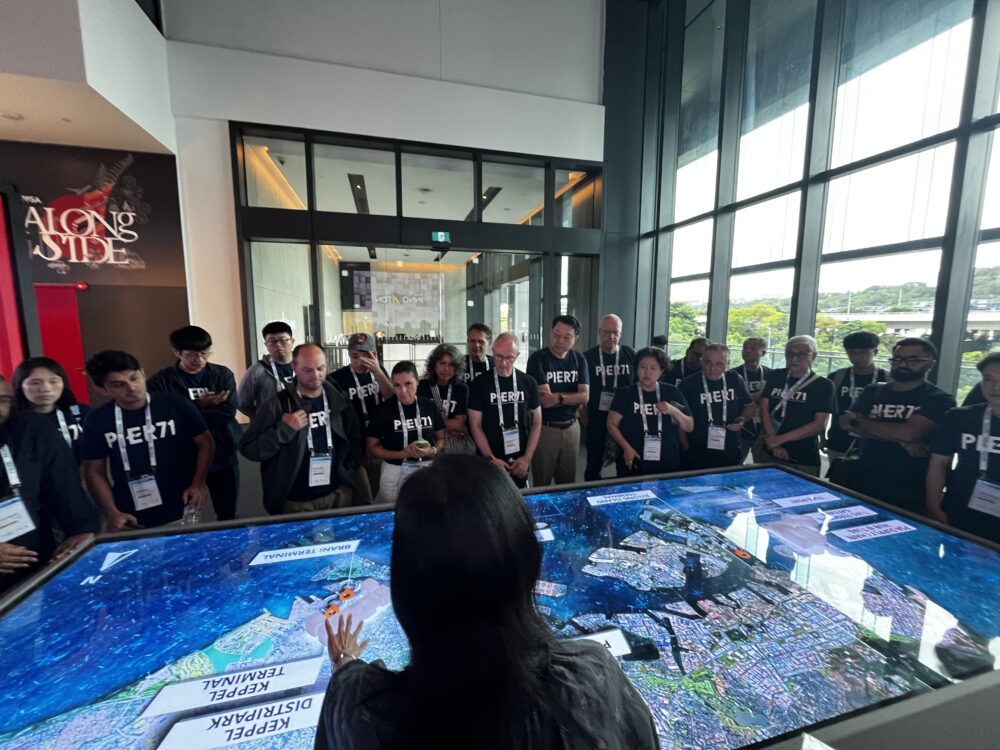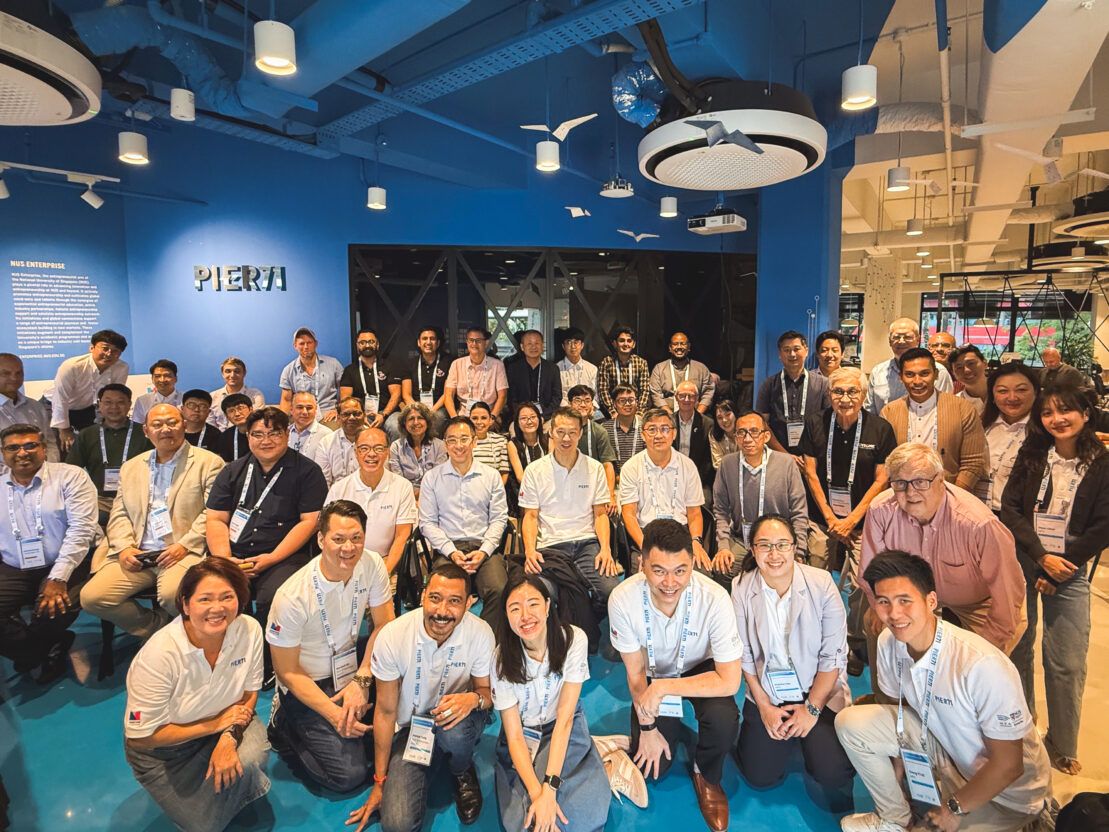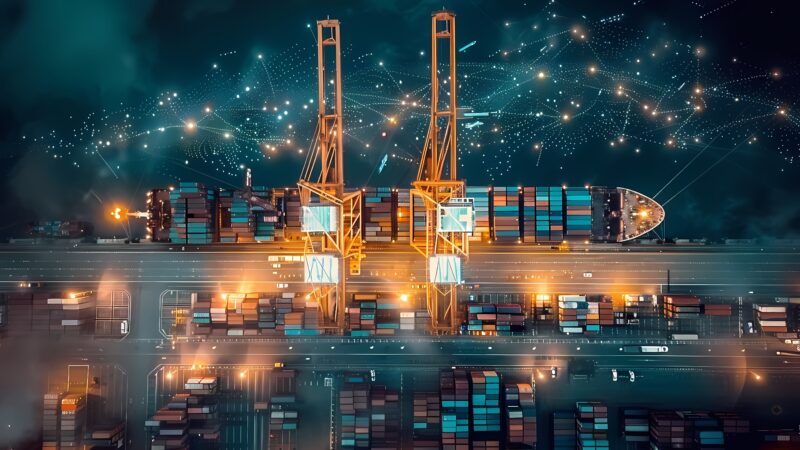
Navigating innovation: how Singapore’s PIER71 empowers startups in the maritime sector
This article explores PIER71, the innovation ecosystem developed by the Maritime and Port Authority of Singapore in partnership with the enterprise arm of the National University of Singapore.

Chiara Saragani is a researcher at CENIT and PhD student in digitalization at the Port of Barcelona.

The maritime sector is a complex world, and ports are even more so. They involve multiple stakeholders, making it difficult for external actors to navigate and understand, and attracting startups has always been a challenge. The sector is also highly regulated, with strict safety, environmental, and operational standards that can make introducing innovation a slow process. Legacy systems and traditional ways of working often make it hard to introduce new technologies, while the high cost of implementation and long testing cycles can be a barrier for small companies.
To address these challenges, ports and related organisations are collaborating to support startups through a variety of initiatives and strategies.
PIER71: connecting startups, corporates and innovation
PIER71, which stands for Port Innovation Ecosystem Reimagined @ BLOCK 71, is a joint collaboration which was born in 2018 between the Maritime and Port Authority of Singapore (MPA) and NUS Enterprise, which is the entrepreneurial part of the National University of Singapore.
It is a maritime innovation ecosystem based in Singapore, dedicated to driving innovation and creating opportunities for startups looking to make an impact in the sector. To date, PIER71 has collaborated with over 160 startups from more than 20 countries, building a truly global innovation network. It has also partnered with more than 70 corporatesto introduce cutting-edge technologies in Singapore, generating over 150 innovation opportunities along the way.
Their mission can be summarised in four key areas:
- attracting and nurturing the best maritime startups across the region;
- building and expanding a strong international network of maritime stakeholders and innovators;
- driving the adoption of new maritime technologies;
- and staying at the forefront of trends shaping the maritime ecosystem.
The PIER71 programmes
To attract new talent, PIER71 runs a wide range of initiatives throughout the year.
- Its flagship programme is the Smart Port Challenge, an annual call for tech startups to tackle real-world challenges in collaboration with Singapore’s maritime industry. Finalists take part in SPC Accelerate, a ten-week programme by NUS Enterprise providing mentorship, market validation, and funding of up to SGD 100,000 to develop and test their solutions.
- Another key initiative is the Landing Pad, a launchpad for startups located at BLOCK71 in Singapore. Smart Port Challenge participants receive priority access to this fully sponsored residency, providing an ideal environment to scale and collaborate. This opportunity is not just for SPC alumni, but also for any companies that are committed to setting up presence in Singapore and enter the maritime sector. Even after completing the programme, they remain part of the PIER71 ecosystem, benefiting from expert masterclasses, mentorship, industry and investor connections, and vibrant co-working facilities that foster growth and innovation.
From challenge to opportunity: PIER71’s flagship programme
The Smart Port Challenge (SPC) is an annual innovation competition that invites tech startups to develop solutions for real-world challenges identified by Singapore’s maritime corporates. Over the years, participating startups have raised more than USD 100 million, successfully deployed over 60 technologies in Singapore, and seen 19 startups expand into new markets through the PIER71 programme.
The challenge unfolds in four stages.
- It begins with Corporate Engagement, where PIER71 works with over 100 maritime stakeholders to identify industry challenges and opportunities for innovation.
- Next comes the Challenge Launch, opening applications for startups while inviting corporates to participate as innovation partners, bringing both sides together.
- The third stage, SPC Accelerate, is a ten-week programme in Singapore that pairs startups with maritime mentors and connects them with corporates, investors, and the wider PIER71 network.
- The final stage, Great Circle, is the grand finale where startups pitch their solutions to industry leaders and compete for cash prizes.
In essence, PIER71 uses these challenges to guide startups in developing solutions while linking them to potential clients in the maritime and industrial sectors. The main focus areas include maritime green technologies, next-generation ports, smart shipping, and digitalisation. Participating in the Smart Port Challenge provides startups with direct access to corporates, investors, and industry experts, alongside tailored workshops, mentoring, and business validation. Startups can tackle real industry challenges, apply for grants of up to $250,000, compete for $70,000 in cash prizes, and benefit from branding opportunities, media exposure, and a fully sponsored residency at PIER71’s Landing Pad.

The Proposed Challenges in 2025
This year’s digitalisation challenges focus on reducing risks during onboard inspections, strengthening maritime cybersecurity, and improving waste recycling systems. Startups are invited to develop solutions for vessel connectivity, energy efficiency, and crew training using digital tools, while other priorities include safer pilot transfers, enhanced situational awareness, and reducing human error at sea.
- Maritime green technology challenges centre on innovative ways to recycle ship waste, promoting sustainability across the sector.
- Next Generation Ports challenges aim to enhance safety, efficiency, and environmental responsibility. Key areas include developing safer and faster cargo hold cleaning methods for bulk carriers, accelerating the validation of robotic stevedoring solutions, improving garbage management from vessels, detecting chemical and oil spills under challenging conditions, and designing eco-friendly hull cleaning methods that reduce downtime and costs.
- Meanwhile, Smart Shipping challenges encourage startups to advance ship connectivity and operational efficiency. This includes high-bandwidth communication systems for steel-enclosed areas, digital tools for optimising energy use, and training platforms to help crews adopt sustainable practices. Other priorities focus on safer pilot and crew transfer solutions, improved situational awareness for navigation and port operations, and reducing human error at sea through real-time monitoring of crew performance and wellbeing.
In his keynote, Mr Ang Wee Keong, Chief Executive of the Maritime and Port Authority of Singapore (MPA), highlighted the global scale of PIER71’s innovation ecosystem, noting that this year’s Smart Port Challenge drew a record 288 proposals from 35 countries. He announced that 19 companies were chosen for the 10-week Accelerate programme, and they have secured over 30 Letters of Intent (LOIs) from maritime firms, signalling strong demand for fresh ideas. Since 2018, PIER71 has incubated nearly 170 marine-technology firms, with several international participants establishing presence in Singapore.
Mr Ang raised up success stories like Groundup.a, whose predictive-maintenance AI raised USD 4.25 million, and Open Ocean Robotics, which deployed its uncrewed vessel for chemical-spill simulations. He also revealed further support for innovation: a MarineTech Startup Directory to connect maritime players with tech firms, and expanded eligibility for MPA’s MINT Startup Scheme, now open to companies backed by both VCs and corporate venture arms.
He expressed gratitude to the 28 innovation partners contributing challenge statements and test-bedding opportunities, and thanked six corporate prize sponsors — ABS, OCBC, PSA Ventures, Reefknot Capital, RINA, and ZEBOX — for backing the programme. Looking forward, Mr Ang invited more stakeholders — corporates, investors, and ecosystem players alike — to deepen their engagement and help grow PIER71 for its 2026 programmes, strengthening Singapore’s role as a global maritime innovation hub.
Turning industry challenges into startup opportunities
PIER71 plays a pivotal role in bridging the gap between industry needs and startup innovation. By working closely with corporates, investors, and other partners, they identify real-world challenges and then present these opportunities to startups. This approach not only helps startups understand what the industry truly needs but also gives them a clear pathway to develop solutions, test their ideas, and make a meaningful impact in the maritime sector.
Through its programmes and initiatives, PIER71 continues to foster a thriving ecosystem where innovation, collaboration, and sustainability go hand in hand. For startups, it is more than just a platform, it is a gateway to growth, global connections, and the chance to shape the future of maritime.



